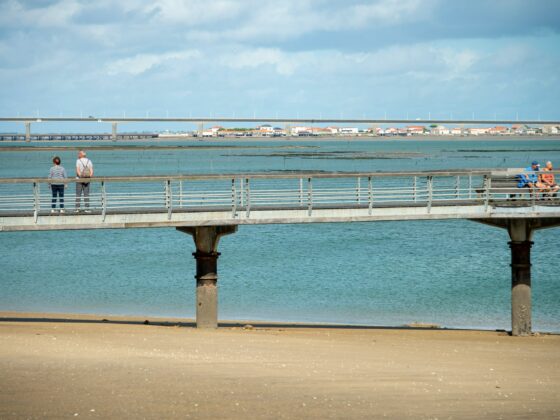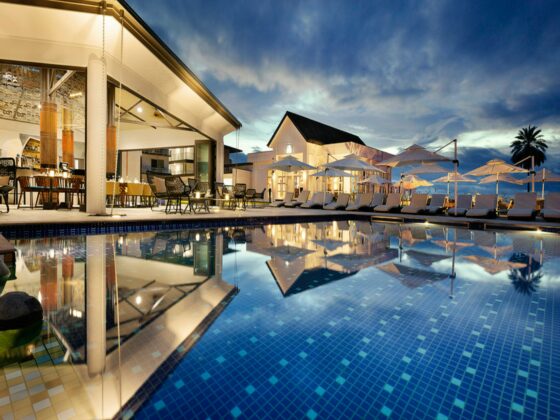
Environmental Stewardship Builds Trust
As sustainability becomes a baseline expectation, hotels that proactively demonstrate environmental responsibility can differentiate themselves and build deeper trust with guests. In turn, that trust becomes the foundation for brand loyalty.
“Many return not only for the luxury experience, but because they value Solaz’s commitment to environmental responsibility,” Jimenez said. “Our sustainable practices serve as a key differentiator and enhance overall guest satisfaction.”
MGM Resorts has found that corporate clients, particularly in the meetings and conventions space, actively seek out properties with robust environmental programs.
“Many of our meeting and convention clients collaborate with us to enhance the social and environmental benefits associated with their events,” Gulich said. “These guests benefit from our existing sustainability initiatives, but we can also design bespoke solutions to enhance event sustainability without compromising attendee experience.”
More broadly, studies support the idea that sustainability builds guest trust—and that trust translates to long-term loyalty. A 2024 study published in the Journal of Hospitality and Tourism found that guests in the U.S. increasingly prioritize eco-friendly practices when choosing accommodations, and hotels that adopt energy conservation, waste reduction, and local sourcing are more likely to build stronger, long-term relationships with their customers. The study also notes that perceiving a hotel as ethical and environmentally responsible can lead to repeat bookings and positive word-of-mouth, making sustainability a smart business strategy.
Eco-Amenities That Encourage Repeat Stays
Trust is further solidified when guests experience sustainability firsthand through thoughtful amenities and practices that enhance their stay.
At Solaz, standout elements include 53,000 square meters of green areas including green roofs that naturally cool rooms, a desalination plant that provides 60,000 liters of fresh water daily, and a wastewater treatment system used for irrigation. The resort’s smart rooms, powered by Crestron technology, automatically adjust temperature, lighting, and even curtain positions to optimize energy use. Solaz is also the only hotel in Los Cabos with automated air conditioning and pool heating systems, ensuring maximum efficiency.
“These technologies operate discreetly, enhancing sustainability without compromising the luxury experience,” Jimenez explained.
MGM Resorts has implemented large-scale upgrades that benefit both the environment and the guest experience. For example, its Las Vegas Strip properties hand-sort all trash behind the scenes to maximize waste diversion from landfills. They recycle over 30 materials—including hangers, grease, and oyster shells—and now use solar power for up to 90% of their daytime energy needs.
Even where its properties embrace theatrical flair, sustainability plays a central role. For example, the iconic Lake Bellagio and its fountains don’t rely on the Colorado River for water. Instead, they’re fed by underground wells and runoff from the “O” Theater inside Bellagio.
Food waste, often a significant challenge in hospitality, is another area where MGM Resorts shines. “We’ve donated more than 5 million meals into our community since 2016,” Gulich said. “Food is our single largest waste stream, so the fact that it can go to people instead of a pig farm or to landfill is incredible.”
Similarly, the AT&T Hotel & Conference Center uses a tablet-based waste-tracking program called Waste Not 2.0 to reduce food waste, Cunningham said. In just one year, the hotel diverted more than 150 tons of compost and more than 8,300 pounds of coffee grounds to landscaping efforts. Combined with its recycling program, the property now diverts more than 60% of its waste from landfills.
“Our kitchen is constantly producing,” Cunningham added. “By tracking our waste, we can better understand our opportunities to be efficient. These numbers help us understand where we can purchase less, produce less and train our associates more.”
[Check out HT’s recent profile of MyMatR: a start-up that combines AI-driven waste sorting with data analytics to help hotels streamline operations, reduce costs, and delight eco-conscious guests.]
Additional initiatives at the AT&T Hotel & Conference Center include low-flow fixtures and efficient landscaping, which save over 1.2 million gallons of water annually. Smart HVAC and lighting systems have helped reduce energy use by 20%.
Sustainability as a Loyalty Multiplier
Hospitality has always been about anticipating guest needs. Today, that means recognizing that guests care deeply about their environmental impact and offering experiences that reflect those values without sacrificing comfort.
Sustainability isn’t just a business imperative—it’s becoming a loyalty multiplier. And as more travelers choose with their conscience, the hotels that align their operations with environmental responsibility will continue to earn not just bookings, but lasting brand devotion.









